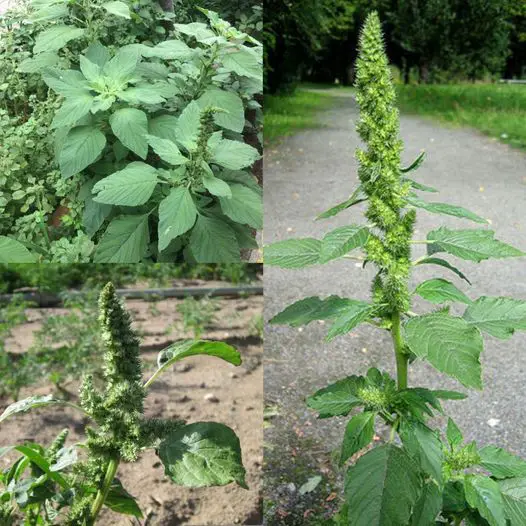Pigweed: A Nutritional Powerhouse for Your Health and Diet
Pigweed, often dismissed as a common garden weed, is actually a treasure trove of nutrition and health benefits. This hardy plant, also known as amaranth, thrives in gardens, fields, and even neglected spaces, but few are aware of its potential to significantly improve overall well-being. Packed with essential vitamins, minerals, and antioxidants, pigweed can be a valuable addition to your diet.
Nutritional Value of Pigweed
Pigweed leaves are a rich source of essential nutrients. They are loaded with vitamins A, C, and K, all of which are crucial for maintaining a healthy body.
Vitamins for Your Health
- Vitamin A: Supports healthy vision, skin, and immune function.
- Vitamin C: Promotes a robust immune system and aids in collagen production for healthy skin and tissues.
- Vitamin K: Plays an essential role in blood clotting and bone health.
Essential Minerals in Pigweed
In addition to vitamins, pigweed is packed with vital minerals like calcium, magnesium, and iron, all of which help combat nutritional deficiencies.
- Calcium: Supports strong bones and teeth.
- Magnesium: Helps regulate muscle and nerve function, blood sugar levels, and blood pressure.
- Iron: Essential for the production of hemoglobin, which carries oxygen in your blood.
How Pigweed Promotes Heart Health
One of the standout benefits of pigweed is its ability to support heart health, thanks to its high fiber content. Fiber helps reduce cholesterol levels by binding with cholesterol particles in the digestive system and removing them from the body. This process lowers the overall cholesterol levels in the blood, which can help reduce the risk of heart disease.
Benefits for Digestive Health
The fiber in pigweed does more than just support heart health—it also aids in digestion. Regular consumption of pigweed can help prevent constipation and promote regular bowel movements. Fiber increases the bulk of the stool, making it easier to pass, which helps maintain a healthy digestive system.
Anti-Inflammatory Properties of Pigweed
Pigweed contains anti-inflammatory compounds that may help reduce inflammation in the body. This can be especially beneficial for individuals dealing with chronic inflammatory conditions like arthritis or inflammatory bowel diseases. Incorporating pigweed into your diet could potentially help alleviate symptoms of these conditions and improve your overall quality of life.
Weight Management Benefits
For those looking to manage their weight, pigweed offers a low-calorie, high-fiber option. The fiber in pigweed helps increase feelings of fullness, which can reduce overall calorie intake. This is especially helpful for those trying to lose weight, as it helps control appetite and supports a balanced diet without adding excessive calories.
Cooking with Pigweed: A Versatile Ingredient
Pigweed is not only nutritious but also highly versatile in the kitchen. Its leaves can be prepared and consumed in various ways, similar to spinach or Swiss chard. Here are some creative ways to incorporate pigweed into your meals:
- Salads: Add fresh pigweed leaves to your salad for a nutrient boost.
- Soups and stews: Pigweed can be added to soups or stews for an extra layer of flavor and nutrition.
- Sautéed greens: Sauté pigweed leaves with garlic and olive oil for a simple, nutritious side dish.
- Pigweed seeds: The seeds of the plant are also edible and can be used in a similar way to quinoa, adding a nutty flavor to your meals.
Sustainable Eating with Pigweed
Incorporating pigweed into your diet is not just beneficial for your health—it’s also a step toward more sustainable eating habits. Pigweed grows abundantly with minimal water and requires no pesticides, making it an eco-friendly food choice. By consuming more pigweed, you’re supporting practices that reduce environmental impact while improving your diet.
Tips for Cooking Pigweed
- Choose young leaves: When harvesting or buying pigweed, select young, tender leaves for the best flavor and texture.
- Blanch the leaves: To reduce bitterness, blanch pigweed leaves in boiling water for a minute before using them in recipes.
- Combine with other greens: Mix pigweed with spinach, kale, or Swiss chard for a more complex flavor profile.
- Store properly: Keep pigweed in the refrigerator in a sealed container or bag for up to a week.
FAQs
Is pigweed safe to eat?
Yes, pigweed is safe to eat when prepared properly. However, like many leafy greens, it contains oxalates, which can contribute to kidney stones in susceptible individuals. If you’re concerned about this, it’s best to eat pigweed in moderation.
Can I eat pigweed raw?
Yes, pigweed can be eaten raw, especially when the leaves are young and tender. Adding raw pigweed to salads is a great way to enjoy its nutritional benefits. However, some people may find the flavor of raw pigweed slightly bitter, in which case cooking it can help.
What does pigweed taste like?
Pigweed has a mild, earthy flavor similar to spinach or Swiss chard. The younger the leaves, the more tender and less bitter they are. Cooking pigweed can mellow out its flavor even further.
How do I know if I’m picking the right type of pigweed?
There are several varieties of pigweed, but the most common edible type is amaranth. If you’re foraging for pigweed, it’s essential to correctly identify the plant to ensure it’s safe to eat. Consulting a plant identification guide or expert is recommended if you’re unsure.
Can pigweed help with weight loss?
Yes, pigweed can be a great addition to a weight loss diet. Its high fiber content helps you feel fuller for longer, which can reduce calorie intake and promote weight management.
In conclusion, pigweed is an excellent source of vitamins, minerals, and fiber that can offer numerous health benefits. From supporting heart and digestive health to promoting weight management, pigweed deserves a spot in your kitchen. Its versatility in cooking and sustainable nature make it a fantastic choice for anyone looking to improve their diet and lifestyle.

